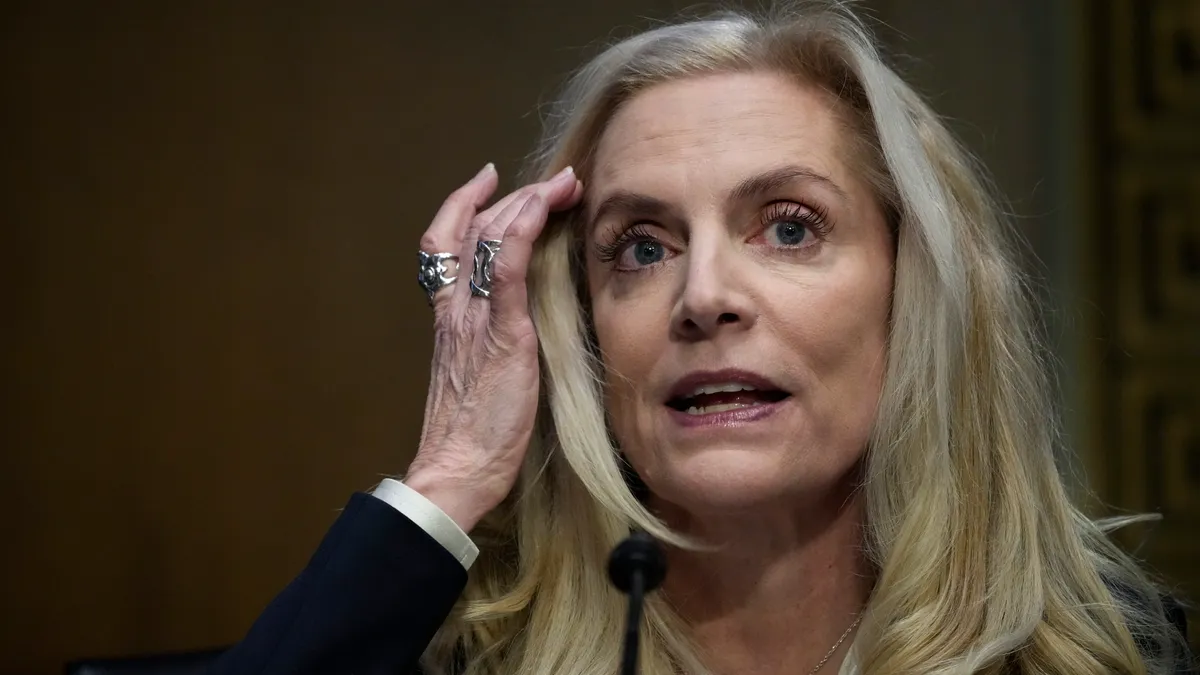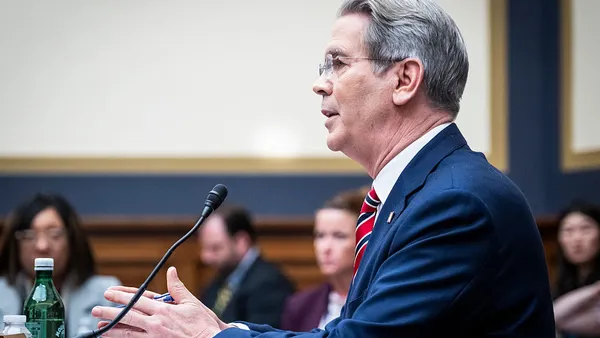The Senate on Tuesday confirmed Federal Reserve Gov. Lael Brainard, by a 52-43 vote, to serve as the central bank’s vice chair.
Then the drama unfolded.
Democrats had initially planned to push ahead with a vote on fellow Fed nominee Lisa Cook. But three in their party — Sens. Ron Wyden of Oregon and Chris Murphy of Connecticut, and Vice President Kamala Harris — announced Tuesday they had tested positive for COVID-19 and couldn’t attend. The presence of all three would be crucial for Cook, who received no Republican support in a vote last month to consider her nomination. Even with a 50-50 party-line split, Harris would need to cast a tie-breaking vote for Cook to be confirmed.
As it was, Senate Banking Committee Chairman Sherrod Brown, D-OH, asked Republicans on Tuesday to delay the Cook vote. But the panel’s ranking member, Sen. Pat Toomey, R-PA, objected.
“It’s very simple. I want to vote on all the noms. Republicans are ready to vote on all the noms,” Toomey said on the Senate floor, according to Roll Call. “Our Democratic colleagues have complained about not having votes. We want to vote.”
In addition to Brainard and Cook, the Senate is considering Jerome Powell’s renomination as Fed chair and economist Philip Jefferson to take an open seat on the central bank’s board.
“We want to vote on Lisa Cook. We want to vote on Chairman Powell. We want to vote on Mr. Jefferson,” Toomey added Tuesday. “We’re ready to vote, not to cancel a vote, and so I object.”
Toomey’s move forced a vote Tuesday on Cook’s nomination, which failed, 51-47. Senate Majority Leader Chuck Schumer, D-NY, changed his vote to no and filed a motion to reconsider Cook’s nomination at a later date.
Toomey then asked Democrats to proceed with votes on Powell and Jefferson this week. But Brown objected, confirming Wednesday to Bloomberg that the votes will wait until Wyden, Murphy and Harris have returned.
Neither Powell nor Jefferson is expected to generate much pushback from Republicans. Brown said he would have allowed the Powell and Jefferson votes if Toomey would have agreed to delay the Cook vote. Toomey asserted Tuesday that Democrats did not delay a vote on former Fed nominee Judy Shelton when a Republican senator was sick.
Brown, in a statement, dug in to Republican lawmakers Tuesday on race.
“It is disappointing that Senate Republicans are exploiting the absences of our colleagues to stop a qualified Black woman,” Brown said. “Once again, they’ve decided that scoring political points is more important than serving the public and bringing down prices for American families.”
Cook would be the first Black woman to serve as a Fed governor. Brown added that Republicans should be “ashamed” at their track record regarding Black women nominees.
Toomey noted that Senate Banking Committee Republicans have voted to advance five Biden administration nominees who are Black women, adding it is “sad and shameful” of Brown to imply “there is some kind of racial bias.”
Toomey stuck to an oft-tread argument from Republicans that Cook’s experience does not qualify her for the position.
"It is worth asking ourselves if these nominees are truly the 'inflation fighters' that the White House claims they are,” Toomey said last month on the Senate floor, according to Roll Call. “In my view, one nominee in particular — professor Lisa Cook — dramatically fails this test. … Professor Cook has nearly zero experience in monetary policy. She does have a Ph.D. in economics. However, not a single one of her publications concerns monetary economics.”
Brown on Tuesday called Republicans’ votes against Black women nominees “a habit” and “a consistent pattern,” and listed Cook’s bona fides. “Truman scholar, Marshall scholar, I believe, too, Ph.D. from Berkeley, graduated from Spelman, teaches at Michigan State,” Brown said. “Twelve out of 12 [Senate banking Republicans] voted against Lisa Cook, saying she's not qualified … So we get no help from them to fill out the Federal Reserve.”
The Fed's new No. 2
Brainard’s confirmation gives the Fed a second-in-command for the first time since Richard Clarida resigned in January, shortly before his term was to expire. Brainard’s term as vice chair is set to end in 2026.
As for the Fed’s other vacant vice chairmanship, paperwork for nominee Michael Barr is expected to be submitted this week, and the White House expressed a desire to have him confirmed by the end of May, Reuters reported Tuesday.
Brainard on Tuesday received votes from seven Republicans, according to The Washington Post: Susan Collins of Maine, Lindsey Graham of South Carolina, Todd Young of Indiana, and four senators from the banking panel — Mike Crapo of Idaho, Cynthia Lummis of Wyoming, Mike Rounds of South Dakota and Bill Hagerty of Tennessee.
Brainard saw markedly less cross-aisle support Tuesday than when she was confirmed as a Fed governor in 2014 by a vote of 61-31.
Toomey on Tuesday re-emphasized his reservations about Brainard, saying she would “undermine the Fed’s credibility and independence by straying” from its statutory mandate.
“Governor Brainard has urged the Fed to address the politically-charged issue of global warming, which is beyond the Fed’s expertise and mission,” Toomey said in a statement.
At her January confirmation hearing, Toomey asked Brainard whether her support for more climate research and analysis at the Fed was “a precursor to direct capital away from” fossil-fuel companies.
“We would not tell banks which sectors to lend to or not lend to, but we do want to make sure they are measuring, monitoring and managing [their] material risks,” Brainard replied.
Toomey, however, dismissed her response as semantics.
Other Republicans who voted against Brainard may have opposed a series of dissents she issued over the past four years, against steps the Fed took to ease 2007-08 crisis-era regulations.














